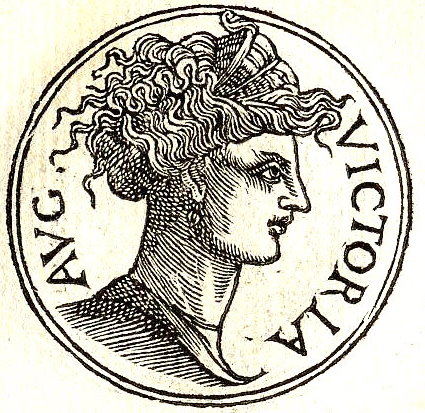Victoria (Roman usurper) on:
[Wikipedia]
[Google]
[Amazon]
 Victoria (c.231 c.271), also known as Vitruvia, was a leader in the
Victoria (c.231 c.271), also known as Vitruvia, was a leader in the
''Historia Augusta''
5.3; 7.1–2; 31.1–5. However, given the ''Historias notorious unreliability, the veracity of these elements is doubtful.
 Victoria (c.231 c.271), also known as Vitruvia, was a leader in the
Victoria (c.231 c.271), also known as Vitruvia, was a leader in the Roman
Roman or Romans most often refers to:
*Rome, the capital city of Italy
*Ancient Rome, Roman civilization from 8th century BC to 5th century AD
*Roman people, the people of ancient Rome
*''Epistle to the Romans'', shortened to ''Romans'', a letter ...
breakaway realm known as the Gallic Empire
The Gallic Empire or the Gallic Roman Empire are names used in modern historiography for a breakaway part of the Roman Empire that functioned ''de facto'' as a separate state from 260 to 274. It originated during the Crisis of the Third Century, w ...
in the late 3rd century. She was the mother of Victorinus
Marcus Piavonius VictorinusSome of the inscriptions record his name as M. Piavvonius Victorinus, as does the first release of coins from the Colonia mint. A mosaic from Augusta Treverorum (Trier) lists him as Piaonius. was emperor in the Gallic ...
, who ruled as Gallic Emperor until his assassination in 271. Afterwards, Victoria used her authority to stabilize the empire and select a successor.
History
Victoria is mentioned inAurelius Victor
Sextus Aurelius Victor (c. 320 – c. 390) was a historian and politician of the Roman Empire. Victor was the author of a short history of imperial Rome, entitled ''De Caesaribus'' and covering the period from Augustus to Constantius II. The work w ...
's '' Liber de Caesaribus'', and in the account of the Thirty Tyrants
The Thirty Tyrants ( grc, οἱ τριάκοντα τύραννοι, ''hoi triákonta týrannoi'') were a pro-Spartan oligarchy installed in Athens after its defeat in the Peloponnesian War in 404 BC. Upon Lysander's request, the Thirty were elec ...
in the unreliable ''Historia Augusta
The ''Historia Augusta'' (English: ''Augustan History'') is a late Roman collection of biographies, written in Latin, of the Roman emperors, their junior colleagues, designated heirs and usurpers from 117 to 284. Supposedly modeled on the sim ...
''. Nothing is known of her early life, though she must have been from a wealthy and distinguished Gallic family, which produced the emperor Victorinus
Marcus Piavonius VictorinusSome of the inscriptions record his name as M. Piavvonius Victorinus, as does the first release of coins from the Colonia mint. A mosaic from Augusta Treverorum (Trier) lists him as Piaonius. was emperor in the Gallic ...
, her son.''Liber de Caesaribus'' 33.12. See Bird, p. 34; 141. According to Aurelius Victor, after Victorinus was killed in a mutiny, Victoria stepped in, using her copious resources to buy the support of the legions. Thus she assured the ascension of her chosen candidate for emperor, Tetricus I
Gaius Pius Esuvius Tetricus was the emperor of the Gallic Empire from 271 to 274 AD. He was originally the (governor) of Gallia Aquitania and became emperor after the murder of Emperor Victorinus in 271, with the support of Victorinus's mother, ...
, who was formerly the governor of Gallia Aquitania
Gallia Aquitania ( , ), also known as Aquitaine or Aquitaine Gaul, was a province of the Roman Empire. It lies in present-day southwest France, where it gives its name to the modern region of Aquitaine. It was bordered by the provinces of Gallia ...
and speculated to be related to her. She also gave the title of Caesar to his son, Tetricus the Younger. The ''Historia Augusta'', which counts her as one of Rome's "Thirty Tyrants", adds additional details, claiming that Victoria initially made Victorinus' otherwise unattested son, Victorinus Junior
Victorinus Junior (supposedly died 271) was a fictional usurper who was claimed to have risen up against the Roman Emperor Aurelian, according to the ''Historia Augusta''. He is included in the list of the Thirty Tyrants.
According to the often ...
, emperor, but that he too was killed, soon after his father.''The Thirty Pretenders'' Trebellius Pollio http://users.clas.ufl.edu/sterk/MeganWilliamsReadings/HA.30pretenders.pdf The ''Historia'' also says that she herself bore the titles ''Mater Castrorum'' ("Mother of the Camp") and '' Augusta'' and minted her own coins. She died shortly after Tetricus' ascension either by murder or natural causes.5.3; 7.1–2; 31.1–5.
See also
*Women in ancient Rome
Freeborn women in ancient Rome were citizens (''cives''), but could not vote or hold political office. Because of their limited public role, women are named less frequently than men by Roman historians. But while Roman women held no direct politi ...
* List of Roman women
The list below includes Roman women who were notable for their family connections, or their sons or husbands, or their own actions. In the earlier periods, women came to the attention of (later) historians either as poisoners of their husbands ( ...
Notes
References
* 271 deaths Thirty Tyrants (Roman) 3rd-century Roman women Year of birth unknown Romans from unknown gentes Gallic Empire 3rd-century women rulers Augustae {{AncientRome-bio-stub